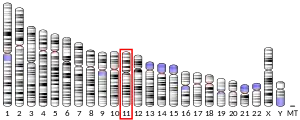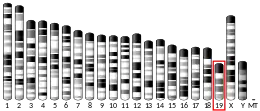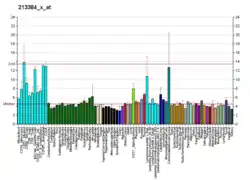PLCB3
1-Phosphatidylinositol-4,5-bisphosphate phosphodiesterase beta-3 is an enzyme that in humans is encoded by the PLCB3 gene.[5][6]
The gene codes for the enzyme phospholipase C β3. The enzyme catalyzes the formation of inositol 1,4,5-trisphosphate and diacylglycerol from phosphatidylinositol 4,5-bisphosphate. This reaction uses calcium as a cofactor and plays an important role in the intracellular transduction of many extracellular signals. This gene is activated by two G-protein alpha subunits, alpha-q and alpha-11, as well as G-beta gamma subunits.
Interactions
PLCB3 has been shown to interact with Sodium-hydrogen exchange regulatory cofactor 2.[7]
References
- GRCh38: Ensembl release 89: ENSG00000149782 - Ensembl, May 2017
- GRCm38: Ensembl release 89: ENSMUSG00000024960 - Ensembl, May 2017
- "Human PubMed Reference:". National Center for Biotechnology Information, U.S. National Library of Medicine.
- "Mouse PubMed Reference:". National Center for Biotechnology Information, U.S. National Library of Medicine.
- Weber G, Friedman E, Grimmond S, Hayward NK, Phelan C, Skogseid B, Gobl A, Zedenius J, Sandelin K, Teh BT (March 1995). "The phospholipase C beta 3 gene located in the MEN1 region shows loss of expression in endocrine tumours". Hum. Mol. Genet. 3 (10): 1775–81. doi:10.1093/hmg/3.10.1775. PMID 7849701.
- "Entrez Gene: PLCB3 phospholipase C, beta 3 (phosphatidylinositol-specific)".
- Hwang JI, Heo K, Shin KJ, Kim E, Yun C, Ryu SH, Shin HS, Suh PG (June 2000). "Regulation of phospholipase C-beta 3 activity by Na+/H+ exchanger regulatory factor 2". J. Biol. Chem. 275 (22): 16632–7. doi:10.1074/jbc.M001410200. PMID 10748023.
Further reading
- Carozzi AJ, Kriz RW, Webster C, Parker PJ (1992). "Identification, purification and characterization of a novel phosphatidylinositol-specific phospholipase C, a third member of the beta subfamily". Eur. J. Biochem. 210 (2): 521–9. doi:10.1111/j.1432-1033.1992.tb17450.x. PMID 1333955.
- Cefai D, Debre P, Kaczorek M, Idziorek T, Autran B, Bismuth G (1990). "Human immunodeficiency virus-1 glycoproteins gp120 and gp160 specifically inhibit the CD3/T cell-antigen receptor phosphoinositide transduction pathway". J. Clin. Invest. 86 (6): 2117–24. doi:10.1172/JCI114950. PMC 329852. PMID 1979339.
- Zauli G, Previati M, Caramelli E, Bassini A, Falcieri E, Gibellini D, Bertolaso L, Bosco D, Robuffo I, Capitani S (1995). "Exogenous human immunodeficiency virus type-1 Tat protein selectively stimulates a phosphatidylinositol-specific phospholipase C nuclear pathway in the Jurkat T cell line". Eur. J. Immunol. 25 (9): 2695–700. doi:10.1002/eji.1830250944. PMID 7589147. S2CID 20562627.
- Lagercrantz J, Carson E, Phelan C, Grimmond S, Rosén A, Daré E, Nordenskjöld M, Hayward NK, Larsson C, Weber G (1995). "Genomic organization and complete cDNA sequence of the human phosphoinositide-specific phospholipase C beta 3 gene (PLCB3)". Genomics. 26 (3): 467–72. doi:10.1016/0888-7543(95)80164-H. PMID 7607669.
- Mazuruk K, Schoen TJ, Chader GJ, Rodriguez IR (1995). "Structural organization and expression of the human phosphatidylinositol-specific phospholipase C beta-3 gene". Biochem. Biophys. Res. Commun. 212 (1): 190–5. doi:10.1006/bbrc.1995.1955. PMID 7612006.
- Sinke RJ, Geurts van Kessel AG (1995). "Localization of the human phosphatidylinositol-specific phospholipase c beta 3 gene (PLCB3) within chromosome band 11q13". Genomics. 25 (2): 568–9. doi:10.1016/0888-7543(95)80060-Y. PMID 7789993.
- Chen P, Mayne M, Power C, Nath A (1997). "The Tat protein of HIV-1 induces tumor necrosis factor-alpha production. Implications for HIV-1-associated neurological diseases". J. Biol. Chem. 272 (36): 22385–8. doi:10.1074/jbc.272.36.22385. PMID 9278385.
- Snow BE, Hall RA, Krumins AM, Brothers GM, Bouchard D, Brothers CA, Chung S, Mangion J, Gilman AG, Lefkowitz RJ, Siderovski DP (1998). "GTPase activating specificity of RGS12 and binding specificity of an alternatively spliced PDZ (PSD-95/Dlg/ZO-1) domain". J. Biol. Chem. 273 (28): 17749–55. doi:10.1074/jbc.273.28.17749. PMID 9651375.
- Wang S, Zhou Y, Lukinius A, Oberg K, Skogseid B, Gobl A (1998). "Molecular cloning and characterization of a cDNA encoding mouse phospholipase C-beta3". Biochim. Biophys. Acta. 1393 (1): 173–8. doi:10.1016/s0005-2760(98)00074-5. PMID 9714794.
- Mayne M, Bratanich AC, Chen P, Rana F, Nath A, Power C (1998). "HIV-1 tat molecular diversity and induction of TNF-alpha: implications for HIV-induced neurological disease". Neuroimmunomodulation. 5 (3–4): 184–92. doi:10.1159/000026336. PMID 9730685. S2CID 19529677.
- Haughey NJ, Holden CP, Nath A, Geiger JD (1999). "Involvement of inositol 1,4,5-trisphosphate-regulated stores of intracellular calcium in calcium dysregulation and neuron cell death caused by HIV-1 protein tat". J. Neurochem. 73 (4): 1363–74. doi:10.1046/j.1471-4159.1999.0731363.x. PMID 10501179. S2CID 25410140.
- Hwang JI, Heo K, Shin KJ, Kim E, Yun C, Ryu SH, Shin HS, Suh PG (2000). "Regulation of phospholipase C-beta 3 activity by Na+/H+ exchanger regulatory factor 2". J. Biol. Chem. 275 (22): 16632–7. doi:10.1074/jbc.M001410200. PMID 10748023.
- Wang JC, Waltner-Law M, Yamada K, Osawa H, Stifani S, Granner DK (2000). "Transducin-like enhancer of split proteins, the human homologs of Drosophila groucho, interact with hepatic nuclear factor 3beta". J. Biol. Chem. 275 (24): 18418–23. doi:10.1074/jbc.M910211199. PMID 10748198.
- Mayne M, Holden CP, Nath A, Geiger JD (2000). "Release of calcium from inositol 1,4,5-trisphosphate receptor-regulated stores by HIV-1 Tat regulates TNF-alpha production in human macrophages". J. Immunol. 164 (12): 6538–42. doi:10.4049/jimmunol.164.12.6538. PMID 10843712.
- Caricasole A, Sala C, Roncarati R, Formenti E, Terstappen GC (2000). "Cloning and characterization of the human phosphoinositide-specific phospholipase C-beta 1 (PLC beta 1)". Biochim. Biophys. Acta. 1517 (1): 63–72. doi:10.1016/S0167-4781(00)00260-8. PMID 11118617.
- Stålberg P, Lopez-Egido JR, Wang S, Gobl A, Oberg K, Skogseid B (2001). "Differentially expressed cDNAs in PLCbeta3-induced tumor suppression in a human endocrine pancreatic tumor cell line: activation of the human mismatch repair protein 3 gene". Biochem. Biophys. Res. Commun. 281 (1): 227–31. doi:10.1006/bbrc.2001.4329. PMID 11178984.
- Xia C, Bao Z, Yue C, Sanborn BM, Liu M (2001). "Phosphorylation and regulation of G-protein-activated phospholipase C-beta 3 by cGMP-dependent protein kinases". J. Biol. Chem. 276 (23): 19770–7. doi:10.1074/jbc.M006266200. PMID 11278298.
- Yue C, Sanborn BM (2001). "KN-93 inhibition of G protein signaling is independent of the ability of Ca2+/calmodulin-dependent protein kinase II to phosphorylate phospholipase Cbeta3 on 537-Ser". Mol. Cell. Endocrinol. 175 (1–2): 149–56. doi:10.1016/S0303-7207(01)00383-5. PMID 11325525. S2CID 338776.
- Bennasser Y, Badou A, Tkaczuk J, Bahraoui E (2002). "Signaling pathways triggered by HIV-1 Tat in human monocytes to induce TNF-alpha". Virology. 303 (1): 174–80. doi:10.1006/viro.2002.1676. PMID 12482669.
This article is issued from Wikipedia. The text is licensed under Creative Commons - Attribution - Sharealike. Additional terms may apply for the media files.




